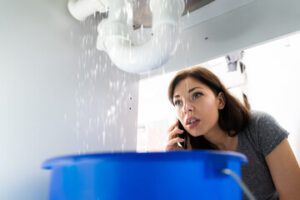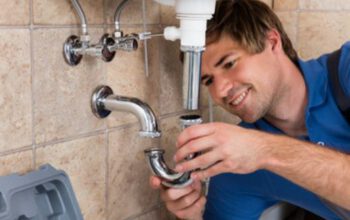When something goes wrong with your plumbing, you want to act fast. That means calling an emergency plumber as soon as possible.
There are several common plumbing emergencies that homeowners may encounter. They can range from minor leaks to major problems that require a professional fix. Click Here to hire one.
A burst pipe is a plumbing emergency that requires immediate attention to prevent damage to your property. Whether it is a previously fixed pipe that has broken again or a completely new burst, emergency plumbers are available 24 hours a day to get you back up and running.
A number of factors can cause pipes to burst, including freezing weather, invasive roots, excessive clogs, and shifting soil. In addition, old pipes can cause burst when they reach their use-by date.
To avoid this problem, be sure to regularly inspect and maintain your pipes to ensure they are in good working condition. This will prolong their lifespan and help you to save on water utility bills.
Once you have identified a leaking pipe, turn off the main water valve to your home. This will stop any new water from entering the system, making it easier to remove any existing water before the emergency plumber arrives.
In addition, make sure to isolate the affected pipe by shutting off any electrical equipment or other fixtures that may be in close proximity to it. This will keep anyone from getting electrocuted in the event of a sudden flood.
While you wait for the emergency plumber, do some quick cleanup of the area around the pipe to limit any further damage. Take out any valuables, like electronics or paper documents, and move them to a safer location.
If the burst pipe is within a bathroom, be sure to drain any excess water from the tub or shower before leaving the room. This will help to reduce the risk of mold growth and other hazards.
Another common symptom of a burst pipe is a decrease in water pressure. This can be a warning that the pipe is in need of repair.
Depending on the cause of the pipe, you might need to replace it with a new one. This will require the help of a licensed plumber, but it’s well worth the investment to keep your family safe and avoid costly repairs down the road.
In the meantime, you can try to fix a burst pipe with a rubber sleeve or wood piece and a clamp. This is a simple way to prevent the water from coming out, but it won’t last long.
Blocked drains are often a sign of an emergency plumbing issue that requires professional help. It can be a minor problem, such as a blockage in your sink or toilet, or it may be something more serious such as sewage backup or damage to your drainage system.
Some of the more common causes of blocked drains are dirt, food scraps, soap, hair, shaving cream, toothpaste, and waste products such as sanitary pads. Mineral deposits can also build up and clog drains, especially if you live in an area with hard water.
These blockages can cause a variety of problems for the homeowner, from smells that are difficult to deal with to slow drainage. Understanding what causes a blocked drain can be an important first step in identifying the problem and taking the necessary steps to get it fixed.
During severe weather, drains are often overwhelmed with rainwater and debris, which can clog them. This can create a lot of mess in your backyard, and it can also be damaging to your home’s foundation, so it’s a good idea to inspect your plumbing system before the start of extreme weather.
A broken or displaced pipe is another common cause of a blocked drain. These pipes are usually made of copper, and these can become damaged over time and cause the edges to catch on solids or paper.
The most effective way to clear a blockage is to use a plunger. A good plunger will be able to break up the clog and release it into the waste pipe.
In some cases, a high-pressure jet blaster can also be used to clear a blockage. Most plumbers carry this equipment, and it is a fast, affordable method for cleaning blocked drains.
Other types of clogs can be harder to unblock and require specialized tools. It is important to contact a plumbing specialist if you have any type of severe blockage in your drainage system, such as tree root intrusion.
It’s also a good idea to invest in a drain guard, which can easily trap any substances that might obstruct your drains. These can include dirt, sediment, and minerals that don’t dissolve when poured down your drain.
Water leaks can be a very serious plumbing problem that needs to be addressed as soon as possible. This is because they can cause severe damage to your home. A leak can also increase your utility bill.
In this case, it’s important to call an emergency plumber as soon as you notice the leak. This way, they can get to the source of the issue as soon as possible and fix the problem quickly.
Leaks can be caused by a number of different things, including broken pipes, clogged drains, and sewage backups. The best way to identify a plumbing emergency is to keep an eye out for any signs that the problem may be more severe than it looks.
For example, if you notice that your toilet keeps leaking, it’s important to contact an emergency plumber as soon as possible. This is because a toilet that constantly leaks can be a sign of a problem with its float mechanism or a clogged pipe.
If you notice that a faucet or sink is leaking, it’s also important to call an emergency plumber as soon as possible. This will help them to fix the issue quickly and avoid more expensive repairs in the future.
Another common plumbing issue that can cause a leak is a toilet that overflows. If this happens, it’s best to shut off the water supply before calling an emergency plumber.
A toilet that overflows is an emergency plumbing issue because it can cause damage to the interior of your house. If the issue isn’t fixed immediately, it can result in mold and mildew growth that could affect your health and safety.
In addition, it can be very expensive to repair the damage that the overflow causes. This is why it’s important to call an emergency plumber to fix the problem as soon as you notice it.
Leak detection is a major topic in leak science. It involves localization, locating, and pinpointing (LLP). This is done using a variety of tools, including district-metered area surveys and fitting surveys.
A water heater provides hot and cold water for showers, washing machines, and other household needs. It also heats the water for the heating and cooling system in a home or office building.
Most water heaters are gas or electric powered and have a storage tank. These storage tank water heaters store a predetermined amount of heated water in a tank so that when the tap is turned on, the water is immediately warm.
These types of water heaters are a good choice for homes with limited space because they only need to heat a small amount of water at a time. However, they are not ideal for large families because they can’t keep up with demand.
There are many different types of water heaters available, including storage, tankless, indirect, and point-of-use. To determine which type is best for your home, you’ll need to consider energy efficiency, costs, and size.
Generally, older water heaters are less energy efficient and cost more to operate than newer models. Replacing an old water heater with a more efficient model can help to reduce your energy bills and utility costs.
Before you make a decision on the right water heater for your home, be sure to research your options and learn more about each option. Visit the pages on different types of water heaters (linked above) to get more information and find out if the energy efficiency and costs are worth it for your family’s needs.
In addition, be sure to check out the information about the fuel type or energy source your water heater will use, which can influence its annual operation costs as well as its size and energy efficiency.
Some types of water heaters can be fueled by solar or geothermal energy. Others can be fueled by heating oil, propane, or liquefied petroleum gas.
Another popular choice for homeowners is a heat pump water heater that uses the hot air from your home’s heating system to heat your water. This type of water heater is more efficient than traditional storage-type or tankless water heaters and can be an excellent choice for homes in areas where it’s cold in the winter and warm in the summer.

